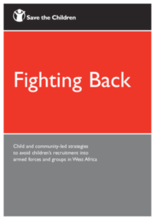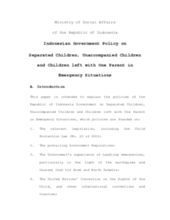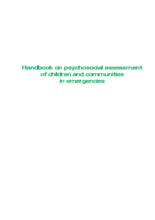Displaying 191 - 200 of 239
This presentation from UNICEF provides an overview of the situation in Myanmar, particulary for children without parental care, and the alternative care system, or lack thereof, in the country.
This presentation from UNICEF provides an overview of the situation in Cambodia, particulary for children without parental care, and the alternative care system in the country.
This presentation provides an overview of the situation in Indonesia for children without parental care in a post-tsunami context and the alternative care system in the country.
This presentation includes the objectives and agenda from an Alternative Care Workshop held in Bangkok in November 2005 to present findings from a study on alternative care choices for children affected by the Tsunami in South East Asia and to share experiences and best practices related to children's care.
Guidance on planning and implementation of child-specific disarmament, demobilization and reintegration (DDR) programming in a peacekeeping environment. Includes definitions, roles for child protection agencies, and key programming considerations on prevention of recruitment.
A twelve page policy brief that outlines Save the Children's position on the type of protection children need in an emergency. Contains some statistical information.
A research study which explores strategies used by children, families and communities to prevent child recruitment into armed forces.
Guidance on preventing child separation, interviewing separated children, and programming for their care and protection needs. Contains specific information on temporary and longer term care options.
Indonesian policy paper on the practice principles for separated and unaccompanied children in an emergency, including guidance on short and long-term care arrangements, tracing, and family reunification
A guidebook focusing on the assessment to be conducted when an emergency first hits or just after a major event in an armed conflict. Outlines the preparation needs of an assessment team and describes what an assessment should concentrate on.










